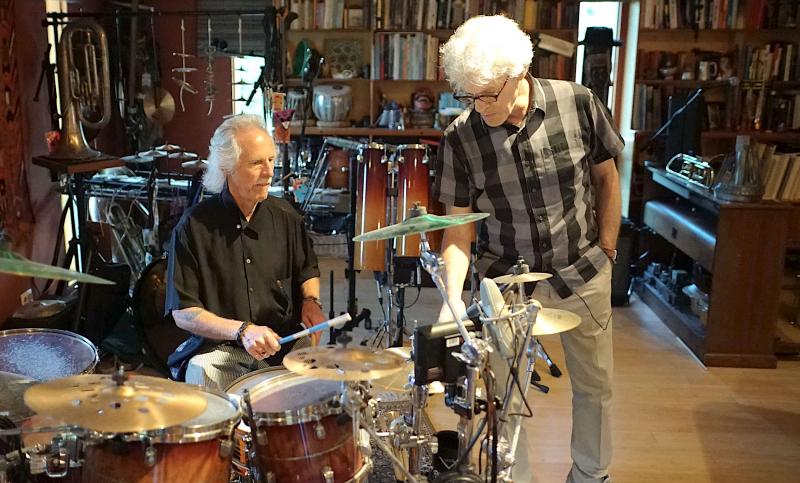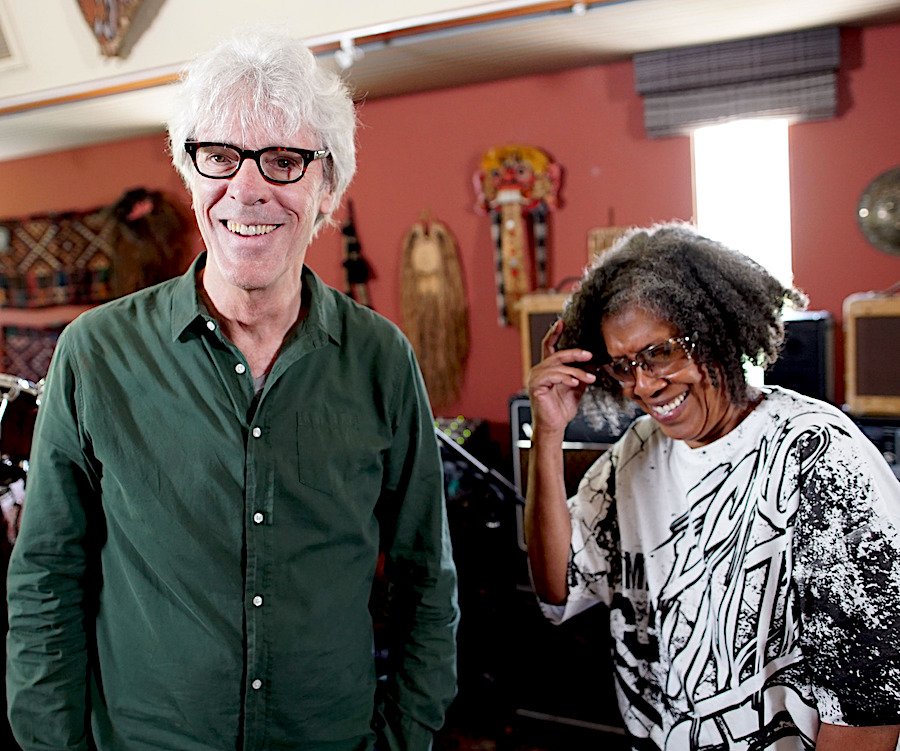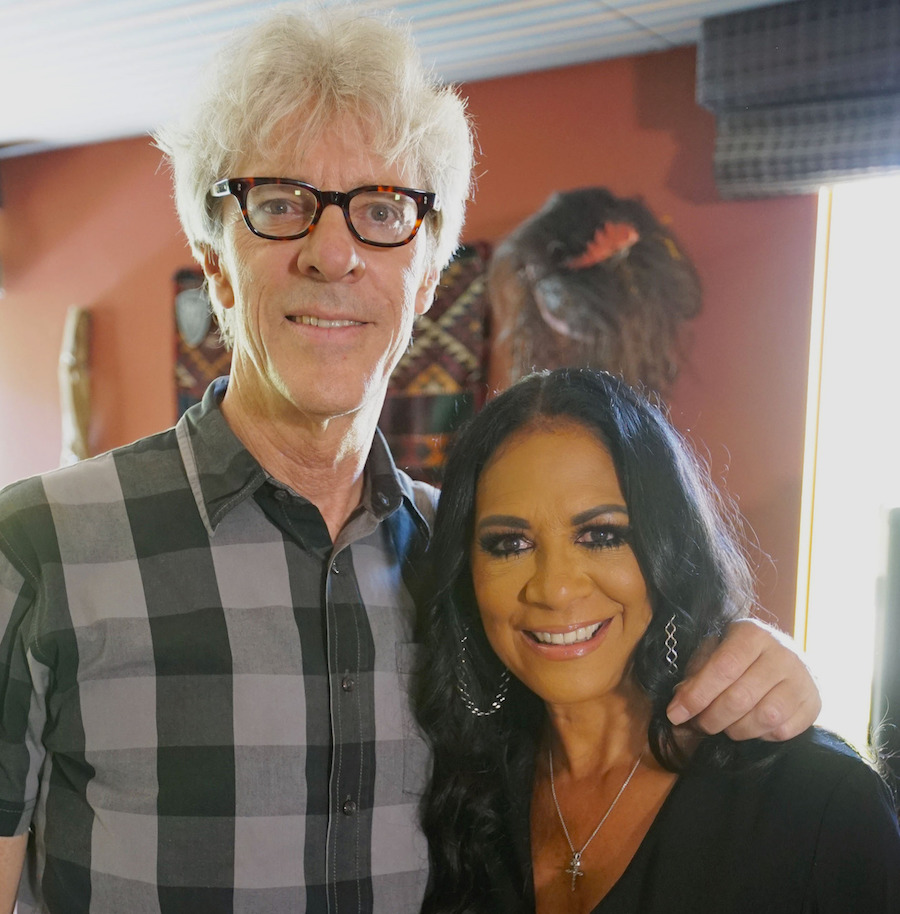On Drums Stewart Copeland!, BBC Four review - no drummer, no rock'n'roll | reviews, news & interviews
On Drums... Stewart Copeland!, BBC Four review - no drummer, no rock'n'roll
On Drums... Stewart Copeland!, BBC Four review - no drummer, no rock'n'roll
Former Police sticksman delivers a guided tour of the percussive universe

On Drums was inhabited by a parade of fine-looking young and middle aged multi-ethnic anglophone drummers, all introduced by Stewart Copeland, the American drummer of the Police.
Copeland suggested that percussionists, sitting behind their kit at the back, were usually given all too little credit, yet were absolutely indispensable. Copeland himself was a wild enthusiast, arms continually outstretched, a presenter on a pogo stick, coming down to earth to give his interviewees hugs. He recalled that as a boy he turned to the drums as he wanted the noise, the banging, the power: a skinny kid could turn into King Kong and feel seven foot tall.
 Edward "Dee Dee" Chandler, the New Orleans drummer at the turn of the last century, was the founding father of drumming, and Copeland did a tell-and-show for New Orleans as the birthplace of all modern American music. In 1896 Chandler invented the foot pedal to play the bass drum: that mean hands were free, and you could bring in the snare drum, and then the drum set, three instruments played by one man, and then continually expanded with multi-tasking drummers. Copeland then leapfrogged the first half of the 20th Century to tell us that rock'n'roll was born on 10 December 1949 in New Orleans, natch: "The Fat Man" by Fats Domino is the first rock'n'roll record for Copeland. His narrative helped us hear Earl Palmer's bass drum leading on the down beat, and the snare on the up-beat or back beat.
Edward "Dee Dee" Chandler, the New Orleans drummer at the turn of the last century, was the founding father of drumming, and Copeland did a tell-and-show for New Orleans as the birthplace of all modern American music. In 1896 Chandler invented the foot pedal to play the bass drum: that mean hands were free, and you could bring in the snare drum, and then the drum set, three instruments played by one man, and then continually expanded with multi-tasking drummers. Copeland then leapfrogged the first half of the 20th Century to tell us that rock'n'roll was born on 10 December 1949 in New Orleans, natch: "The Fat Man" by Fats Domino is the first rock'n'roll record for Copeland. His narrative helped us hear Earl Palmer's bass drum leading on the down beat, and the snare on the up-beat or back beat.
Copeland's first contemporary hard-drumming rock star was Taylor Hawkins from the Foo Fighters, ready to jam with our peripatetic presenter. He was a grinning blonde wearing that ubiquitous American accoutrement the reversed baseball cap along with patterned Bermuda shorts, at home in his studio on what looked to be an American dream mini-estate.
 Chad Smith of Red Hot Chili Peppers went through rock to funk to hip hop and informed us that left-handed Ringo Starr’s originality put The Beatles on the music map. John Densmore of the Doors gave us "Light my Fire" for the psychedelic age. John Coltrane's interplay between his saxophone and Elvin Jones's drumkit had helped create call and response improvisation, and Densmore held the same kind of conversation with Jim Morrison's vocals. Jimi Hendrix shrewdly recruited drummer Mitch Mitchell, Ginger Baker was the powerhouse of Cream, and Led Zeppelin was fuelled by the mountainous John Bonham.
Chad Smith of Red Hot Chili Peppers went through rock to funk to hip hop and informed us that left-handed Ringo Starr’s originality put The Beatles on the music map. John Densmore of the Doors gave us "Light my Fire" for the psychedelic age. John Coltrane's interplay between his saxophone and Elvin Jones's drumkit had helped create call and response improvisation, and Densmore held the same kind of conversation with Jim Morrison's vocals. Jimi Hendrix shrewdly recruited drummer Mitch Mitchell, Ginger Baker was the powerhouse of Cream, and Led Zeppelin was fuelled by the mountainous John Bonham.
And finally the women, who also seemed to be plugged into special sources of youthful energy, whatever their age now. Bobbye Hall (pictured top with Copeland) had worked with Bob Dylan and Joni Mitchell, and her take was that percussion was the final rhythmic ingredient that brought the track to life. The euphoric Sheila E (pictured above) , who used to be Prince's music director, demonstrated how ghost notes inserted into a pattern make it funky – you had to have the discipline to know when not to play. The space between the pattern was the most important part of rhythm. As so often, less is more.
Add comment
The future of Arts Journalism
You can stop theartsdesk.com closing!
We urgently need financing to survive. Our fundraising drive has thus far raised £49,000 but we need to reach £100,000 or we will be forced to close. Please contribute here: https://gofund.me/c3f6033d
And if you can forward this information to anyone who might assist, we’d be grateful.

Subscribe to theartsdesk.com
Thank you for continuing to read our work on theartsdesk.com. For unlimited access to every article in its entirety, including our archive of more than 15,000 pieces, we're asking for £5 per month or £40 per year. We feel it's a very good deal, and hope you do too.
To take a subscription now simply click here.
And if you're looking for that extra gift for a friend or family member, why not treat them to a theartsdesk.com gift subscription?
more TV
 Murder Before Evensong, Acorn TV review - death comes to the picturesque village of Champton
The Rev Richard Coles's sleuthing cleric hits the screen
Murder Before Evensong, Acorn TV review - death comes to the picturesque village of Champton
The Rev Richard Coles's sleuthing cleric hits the screen
 Black Rabbit, Netflix review - grime and punishment in New York City
Jude Law and Jason Bateman tread the thin line between love and hate
Black Rabbit, Netflix review - grime and punishment in New York City
Jude Law and Jason Bateman tread the thin line between love and hate
 The Hack, ITV review - plodding anatomy of twin UK scandals
Jack Thorne's skill can't disguise the bagginess of his double-headed material
The Hack, ITV review - plodding anatomy of twin UK scandals
Jack Thorne's skill can't disguise the bagginess of his double-headed material
 Slow Horses, Series 5, Apple TV+ review - terror, trauma and impeccable comic timing
Jackson Lamb's band of MI5 misfits continues to fascinate and amuse
Slow Horses, Series 5, Apple TV+ review - terror, trauma and impeccable comic timing
Jackson Lamb's band of MI5 misfits continues to fascinate and amuse
 Coldwater, ITV1 review - horror and black comedy in the Highlands
Superb cast lights up David Ireland's cunning thriller
Coldwater, ITV1 review - horror and black comedy in the Highlands
Superb cast lights up David Ireland's cunning thriller
 Blu-ray: The Sweeney - Series One
Influential and entertaining 1970s police drama, handsomely restored
Blu-ray: The Sweeney - Series One
Influential and entertaining 1970s police drama, handsomely restored
 I Fought the Law, ITVX review - how an 800-year-old law was challenged and changed
Sheridan Smith's raw performance dominates ITV's new docudrama about injustice
I Fought the Law, ITVX review - how an 800-year-old law was challenged and changed
Sheridan Smith's raw performance dominates ITV's new docudrama about injustice
 The Paper, Sky Max review - a spinoff of the US Office worth waiting 20 years for
Perfectly judged recycling of the original's key elements, with a star turn at its heart
The Paper, Sky Max review - a spinoff of the US Office worth waiting 20 years for
Perfectly judged recycling of the original's key elements, with a star turn at its heart
 The Guest, BBC One review - be careful what you wish for
A terrific Eve Myles stars in addictive Welsh mystery
The Guest, BBC One review - be careful what you wish for
A terrific Eve Myles stars in addictive Welsh mystery
 theartsdesk Q&A: Suranne Jones on 'Hostage', power pants and politics
The star and producer talks about taking on the role of Prime Minister, wearing high heels and living in the public eye
theartsdesk Q&A: Suranne Jones on 'Hostage', power pants and politics
The star and producer talks about taking on the role of Prime Minister, wearing high heels and living in the public eye
 King & Conqueror, BBC One review - not many kicks in 1066
Turgid medieval drama leaves viewers in the dark
King & Conqueror, BBC One review - not many kicks in 1066
Turgid medieval drama leaves viewers in the dark
 Hostage, Netflix review - entente not-too-cordiale
Suranne Jones and Julie Delpy cross swords in confused political drama
Hostage, Netflix review - entente not-too-cordiale
Suranne Jones and Julie Delpy cross swords in confused political drama

Comments
Forgive my blatant appeal to